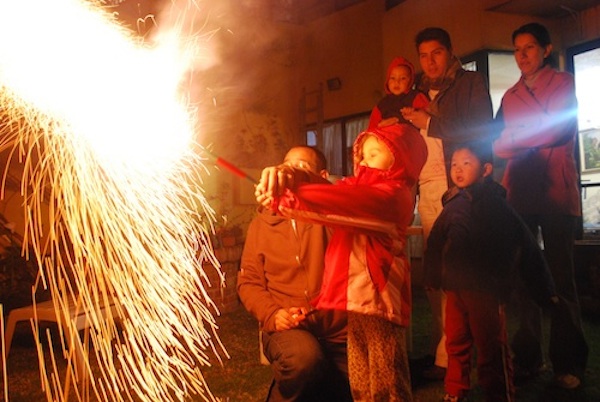If you are a family with multiple cultures represented, a family that has immigrated to a new country, a mixed race family, an interfaith family, una familia multilingüe, an adoptive family, an expat family, a host family, holidays are a balancing act of choosing “which,” “how,” and “when” to incorporate the different traditions and customs.
In our family, my husband is from Mexico, I am from the U.S., and we have two biological daughters, and two sons who are adopted from China and Ethiopia. Out of serendipity, many important holidays from our four cultures fall within a 3-month period.
From November through January (and sometimes February!), our multicultural family celebrates Día de los Muertos, Thanksgiving, St. Nicholas Day, Día de la Virgen de Guadalupe, Las Posadas, Noche Buena, Christmas, New Year’s (both “western” and “Chinese/Lunar”), Genna (Ethiopian Christmas), Reyes Magos, and Timkat (Ethiopian, “Epiphany”) and a few birthdays. Whew! Just typing it out, I’m already making lists in my head of things I need to do and plans I need to organize.
At the beginning, when our kids were younger, we would haphazardly put things together at the last minute: “Isn’t tomorrow Reyes Magos? Should we get the kids something?” or “Let’s go out for Ethiopian food for Genna today.” We didn’t put a lot of thought into teaching the reason behind the traditions, or explaining why the holidays were celebrated and their cultural importance. In fact, because we didn’t have a plan, we would completely skip holidays sometimes!
When our older kids were about 6 or 7, my husband and I decided to make the traditions more intentional. Family traditions are a key component to healthy family relationships: they strengthen family bonds, teach our children our family values, give our kids a sense of identity and security within our family, and instill pride in our children as they develop their cultural heritage. Think about it: the traditions we make with our children create special memories that most likely, they will pass on to their children.
Traditions do not have to be complicated, take a lot of time, or cost a lot of money, but I would argue that they should be deliberate and repeated consistently in order for them to truly become a part of your family culture. In my type-A world, the first thing to do to get organized is to make a list.
And so, on a “date night” to the café at our local bookstore, my husband and I sat down with a notebook and made up a calendar of the holidays that we would like to celebrate with our kids and which traditions we wanted to incorporate. We each had a strong view of the US and Mexican inclusions, but China and Ethiopia required us to do additional research (both on-line and asking our Chinese and Ethiopian friends).
Some of the traditions are simple and quite common: hanging our homemade stockings by the chimney as I had always done as a girl; putting up the Nativity scene as a family as my husband had always done in Mexico; making Christmas cookies together. Others involve meshing traditions from two or more cultures: we now set up the Christmas tree while listening to Christmas music from around the world and eating tapas and Chinese dumplings, and this time of year we read tons of books about Christmas in Mexico and in the U.S.
We wrote everything down, even if it was just attending celebrations as a ritual: visiting the Ethiopian church festival for their Genna (Christmas) celebration; partying with adoptive families at the Chinese Consulate’s annual Chinese New Year event; going to our church for their Día de la Virgen de Guadalupe mass (that is always followed by folkloric dances and amazing food!).
It’s been three years since we’ve made the family calendar, and every year it seems we add new family traditions – sparklers on Noche Buena, a new annual museum exhibit for Dia de los Muertos, and we started inviting friends over every January for a rosca de reyes party. For our family, raising our children to be proud of their cultural background is as important as raising them to be bilingual. Celebrations and their corresponding customs are the perfect way to pass on your cultural values and heritage, don’t you think?
What are your favorite holidays traditions? How do you balance the different cultures in your family?



Whew!!! Sounds busy! We’re a bit more relaxed in our family. Between the five of us we represent England, Ireland, Scotland and Pakistan and although we’re muslim we share in some of the traditional cultural and religious celebrations of our respective countries and the country we presently live in (Canada).
As Forrest Gump was fond of saying, “Life is like a box of chocolates” and while we don’t attempt to eat the entire box, we certainly savor the ones we DO try.
Ha!:) I love the Forest Gump twist:). So true, so true!!
I think one component of our mix is that, because our sons are adopted from cultures that neither my husband or I share, we are always trying to make sure we emphasize and celebrate their heritage. We are fortunate to live in an area that is about 50% Asian, so lots of opportunities for my son from China, but it is more difficult to find Ethiopian culture and we have to be very intentional to include his celebrations. I am always looking for ways to incorporate their cultures into our mix!